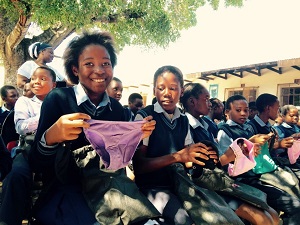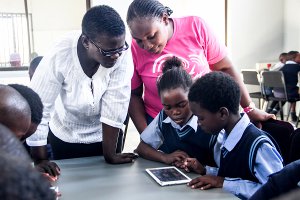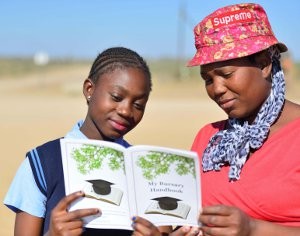Education **
Education
Project Dignity

Project Dignity is designed to empower pubescent school girls from impoverished, rural backgrounds, to complete their education with dignity by equipping them with a long-term solution in the form of washable sanitary pads and panties. These packs will allow girls to attend school more consistently, to achieve their full academic potential and to make confident choices about the future.
The EsiDulini Community Trust, in partnership with the Sabi Sand Pfunanani Trust, has identified the schools of 11 villages surrounding the Sabi Sand Game Reserve. Statistics show that there are over 4000 female learners of pubescent age in the schools of these villages. It is our aim to deliver dignity to every teenage girl in our area by providing ongoing access to the packs of washable sanitary towels.
With $20 (approximately R230), we can offer a girl the confidence to stay in school when puberty sets in.
This is an ongoing initiative that is funded entirely by the generosity of our guests, for which we are so grateful. The aim is to return to primary schools every year to support the emerging teenagers. We would be delighted to welcome you to partner with us in making this fundamental difference in the education of girls from impoverished local communities.
Khurula Secondary School
Huntington village is home to over 500 learners who, until recently, had to travel to another village to attend high school. Neighbouring schools were overcrowded with more than 100 learners in a class.
Working together with our implementation partner, Africa Foundation, and other generous donors, funds were raised for the basic school infrastructure. The community made land available for the school and cleared the area for construction. The school opened in January 2016.
By reducing overcrowding, the quality of learning improved immediately. Families who were previously separated, as a result of children leaving home to attend high school, have been reunited.
Since inception the school has been a uniting force for the Huntington Community, with citizens of all classes getting involved in the school. The community’s pride in the school shows and it is an example of high quality schooling. This is achieved through unbeleivable commitment from teachers, incredible support from parents and consistent discipline enforeced by both teachers and parents.
Justicia Digital Learning Centre
 Following years of measurable impact at the Hazyview Digital Learning Campus, the South African non-profit, Good Work Foundation (GWF), recently launched one of the most rural digital campuses in Africa: the Justicia Digital Learning Campus, which is situated under the marula trees at Madlala High School and endorsed by the Mpumalanga Department of Education.
Following years of measurable impact at the Hazyview Digital Learning Campus, the South African non-profit, Good Work Foundation (GWF), recently launched one of the most rural digital campuses in Africa: the Justicia Digital Learning Campus, which is situated under the marula trees at Madlala High School and endorsed by the Mpumalanga Department of Education.
Perched on the very edge of the Greater Kruger National Park and Sabi Sand Wildtuin, and supported by the EsiDulini Trust, Londolozi Private Game Reserve, Rhino Africa, Airlink and the Sabi Sand Pfunanani Trust, the Justicia campus will continue to prove that, using principles of education technology, it is possible to leapfrog rural education challenges and deliver affordable digital learning to both adults and children living in isolated communities.
GWF implements two major programmes at its digital learning campuses:
The Bridging Academy creates an access bridge between school and work or further education training, preparing rural school leavers for life in modern business environments. This is a one year accredited program.
The Open Learning Academy partners with rural elementary schools, allowing them to outsource digital, English and mathematics literacy to the digital learning campus. This is a continuous program that supports rural learners from Grade 4 to Grade 8. Each digital learning campus can serve up to 10 satellite schools.
To learn more visit: www.goodworkfoundation.org
Youth Projects
The youth are the future of our communities and our country. They hold the key to the success, growth and development of each village. Therefor advancing programmes that benefit the youth is imperative. The SSPT has invested in a number of programmes aimed at unlocking the potential of these young people.
Columba Leadership
Since early 2012, the Columba Leadership Academy has been implemented at seven local high schools. Working with Grade 10s, the Academy aims to motivate youth through its’ values-based leadership programme.
This has yielded significant results. Fewer learners are leaving school prematurely. The matric pass rate has improved and there are less teenage pregnancies. Columba Leadership Academy graduates also positively influence their peers, school and community, by initiating a sustainable community project that is developed and managed by the learners. Educators and school leaders offer additional support.
The Columba Leadership support programme has been introduced to ensure the youth consistently receive the guidance and encouragement needed to fulfil their ideas.
Columba Leadership Academies in our schools have been supported by Africa Foundation, Buffelshoek Trust, EsiDulini Trust, Pride ‘n Purpose, Sabi Sand Pfunanani Trust and Columba Leadership.
Youth Centre
Youth Centres provide a safe place for school children and young adults in the afternoons. This is necessary given the number of child-headed households in the area. Events and programmes are organised and run by community leaders to assist with the positive stimulation and nurturing of the youth. In addition, children who attend the care centre are given a meal and looked after by community volunteers, which is aligned to the Pfunanani Trust’s ethos of helping one another. It also embodies the well-loved African proverb, “it takes a village to raise a child.”
The Trust assisted with upgrading the infrastructure of two community centres during the last year. This has meant the areas are safe for children and better equipped to provide services and support.
Bursary Handbooks
 Passing matric is a milestone for all learners, but their futures remain uncertain. Every year, more than 1000 matriculants in the Bushbuckridge community don’t know what their next step will be. Few have access to tertiary education funding and opportunities. *Downloadable handbook
Passing matric is a milestone for all learners, but their futures remain uncertain. Every year, more than 1000 matriculants in the Bushbuckridge community don’t know what their next step will be. Few have access to tertiary education funding and opportunities. *Downloadable handbook
To assist these students, the Trust compiled a comprehensive Bursary Handbook sharing information on available bursaries, application processes and deadlines. These booklets were handed out to eligible youth in local schools.
Rhandzekile Primary School Computer Centre
In a world dominated by technology, people who do not have access to and training in the use of computers are at a significant disadvantage, both in terms of education and employability. Computer literacy enables school leavers to better compete in a job market calling for entrepreneurs and computer skills. Access to connectivity also allows for enhanced education and teaching in schools.
The Trust funded the upgrade and refurbishment of Rhandzekile Primary School’s computer centre to equip it for the installation of computers. This assists young learners to access this resource.
